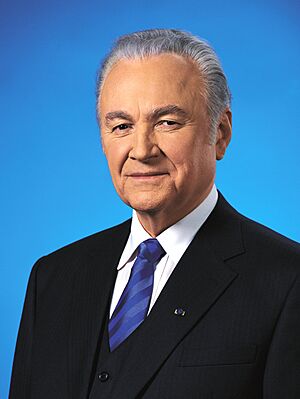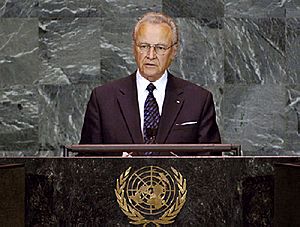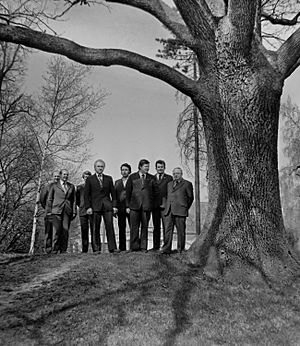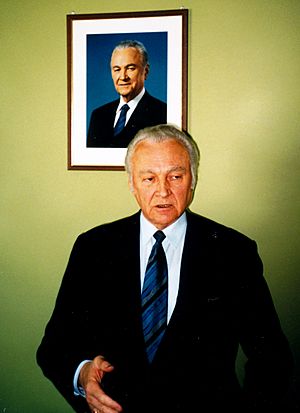Arnold Rüütel facts for kids
Quick facts for kids
Arnold Rüütel
|
|
|---|---|
 |
|
| 3rd President of Estonia | |
| In office 8 October 2001 – 9 October 2006 |
|
| Prime Minister | Mart Laar Siim Kallas Juhan Parts Andrus Ansip |
| Preceded by | Lennart Meri |
| Succeeded by | Toomas Hendrik Ilves |
| Chairman of the Supreme Council of Estonia | |
| In office 29 March 1990 – 5 October 1992 Estonian SSR: 29 March 1990 – 8 May 1990 |
|
| Prime Minister | Edgar Savisaar Tiit Vähi |
| Preceded by | Enn-Arno Sillari |
| Succeeded by | Lennart Meri (President) |
| Chairman of the Presidium of the Supreme Soviet of the Estonian Soviet Socialist Republic | |
| In office 8 April 1983 – 29 March 1990 |
|
| Prime Minister | Valter Klauson Bruno Saul Indrek Toome |
| First Secretary | Karl Vaino Vaino Väljas |
| Preceded by | Johannes Käbin |
| Succeeded by | Himself (Chairman of the Supreme Council) |
| Personal details | |
| Born | 10 May 1928 Pahavalla, Estonia |
| Died | 31 December 2024 (aged 96) |
| Political party | Communist Party (Before 1994) People's Union (1994–2001, 2007–2012) Independent (2001–2007) Conservative People's Party (2012–2024) |
| Spouse | Ingrid Rüütel |
| Children | 2 |
| Signature |  |
Arnold Rüütel (born 10 May 1928 – died 31 December 2024) was an important Estonian politician. He served as the third President of Estonia from 2001 to 2006. He was the second president after Estonia became independent again in 1991, following a period of Soviet rule.
Contents
Who Was Arnold Rüütel?
Arnold Rüütel was a key figure in Estonia's journey to independence. He held several important positions in Estonian politics. He helped guide the country during a big change from Soviet control to being a free nation.
Early Life and Education
Arnold Rüütel was born in Pahavalla village, Saaremaa, Estonia, on 10 May 1928. His parents were Feodor and Juulia Rüütel. He finished his studies at the Agricultural College in Jäneda in 1949.
After college, he worked as a senior farmer in Saaremaa. He also taught at the Tartu School of Agricultural Mechanization. He served in the Soviet Army for a time. In 1957, he became the director of a research farm. Later, in 1963, he led the Tartu Reference State Farm until 1969. He also earned a degree from the Estonian Academy of Agriculture in 1964.
A Leader in Soviet Estonia
From 1969 to 1977, Rüütel was the head (rector) of the Estonian Academy of Agriculture. He then became the last leader of the Estonian Soviet Socialist Republic's parliament, called the Presidium of the Supreme Soviet. This role meant he was also one of the top leaders in the wider Soviet Union. He held this position from 1983 to 1990.
Estonia's Path to Independence
On 29 March 1990, Estonia held its first free elections. Arnold Rüütel was chosen as the Chairman of the Supreme Council, which was like the head of parliament. He was in this role when Estonia officially became fully independent on 20 August 1991. He continued to serve until October 1992.
After independence, Rüütel was part of the group that wrote Estonia's new constitution. In 1992, he ran for president in the first election. He got the most votes in the first round, but not enough to win right away. In the second round, the parliament chose Lennart Meri as president instead of Rüütel.
In 1991, Rüütel earned his doctorate in agriculture. He led the People's Union of Estonia political party from 1994 to 2000. He was also elected to the Estonian parliament (Riigikogu) in 1995. He ran for president again in 1996 but lost to Lennart Meri once more.
Becoming President of Estonia
Arnold Rüütel was elected president on 21 September 2001. He won against Toomas Savi in the final vote. He officially became President of the Republic on 8 October 2001.

What Did President Rüütel Do?
When he became president, Rüütel promised to help people who were struggling with Estonia's fast economic changes. He also wanted to bring more unity to society. During his time as president, he traveled to many countries. He visited leaders in places like Poland, Finland, Lithuania, and Russia to strengthen Estonia's relationships.
In 2006, his term as president was ending. He decided to run for re-election. However, the parliament could not agree on a new president. The decision then went to a special group called the electoral college. In September 2006, Arnold Rüütel lost the election to Toomas Hendrik Ilves. Rüütel received 162 votes, while Ilves received 174. Rüütel congratulated Ilves, and his presidency ended on 9 October 2006.
After His Presidency
Even after leaving office, Arnold Rüütel stayed involved in public life. He supported Mart Helme in the 2016 Estonian presidential election. He also continued to meet with other former presidents, like Nursultan Nazarbayev from Kazakhstan. In June 2024, Rüütel left the Conservative People's Party of Estonia, a party he had been part of for 30 years.
Awards and Recognition
Arnold Rüütel received many awards for his work and service. These awards came from Estonia and other countries around the world. Some of them include:
 Soviet Union: Order of the Badge of Honour (1965)
Soviet Union: Order of the Badge of Honour (1965) Soviet Union: Order of Lenin (1971)
Soviet Union: Order of Lenin (1971) Soviet Union: Order of Friendship of Peoples (1981)
Soviet Union: Order of Friendship of Peoples (1981) Soviet Union: Order of the Red Banner of Labour (1988)
Soviet Union: Order of the Red Banner of Labour (1988) Estonia: Collar of the Order of the Cross of Terra Mariana (2001)
Estonia: Collar of the Order of the Cross of Terra Mariana (2001) Estonia: Collar of the Order of the National Coat of Arms (2008)
Estonia: Collar of the Order of the National Coat of Arms (2008) Estonia: Order of the Tallinn Coat of Arms (2009)
Estonia: Order of the Tallinn Coat of Arms (2009) Finland: Grand Cross of the Order of the White Rose with collar (2001)
Finland: Grand Cross of the Order of the White Rose with collar (2001) Norway: Grand Cross of the Order of St. Olav (2002)
Norway: Grand Cross of the Order of St. Olav (2002) Poland: Great Cross of the Order of the White Eagle
Poland: Great Cross of the Order of the White Eagle Portugal: Grand Collar of the Order of Prince Henry (2003)
Portugal: Grand Collar of the Order of Prince Henry (2003) Luxembourg: Great Cross of the Order of Adolphe of Nassau (2003)
Luxembourg: Great Cross of the Order of Adolphe of Nassau (2003) Iceland: Knight Grand Cross of the Order of the Falcon (2004)
Iceland: Knight Grand Cross of the Order of the Falcon (2004) Slovakia: Grand Cross (or 1st Class) of the Order of the White Double Cross (2005)
Slovakia: Grand Cross (or 1st Class) of the Order of the White Double Cross (2005) Portugal: Grand Collar of the Order of Saint James of the Sword (2006)
Portugal: Grand Collar of the Order of Saint James of the Sword (2006) Italy: Knight Grand Cross with Grand Cordon of the Order of Merit of the Italian Republic
Italy: Knight Grand Cross with Grand Cordon of the Order of Merit of the Italian Republic Latvia: Commander Grand Cross with Chain of the Order of the Three Stars
Latvia: Commander Grand Cross with Chain of the Order of the Three Stars Lithuania: Grand Cross with Golden Chain of the Order of Vytautas the Great (30 September 2004)
Lithuania: Grand Cross with Golden Chain of the Order of Vytautas the Great (30 September 2004) Philippines: Gusi Peace Prize for Statesmanship (27 November 2013)
Philippines: Gusi Peace Prize for Statesmanship (27 November 2013)
Gallery
-
George W. Bush, Vaira Vīķe-Freiberga, Arnold Rüütel, and Valdas Adamkus in Riga, 7 May 2005.
-
Rüütel with Albert II and Queen Paola of Belgium, Prince Henrik of Denmark, Bernadette Chirac, President Jorge Sampaio of Portugal, President George W. Bush and First Lady Laura Bush of the United States, and President Gloria Macapagal Arroyo of the Philippines at the funeral of John Paul II.
-
Arnold Rüütel with Vladimir Putin and Patriarch Alexy II in January 2005.
-
Arnold Rüütel and his wife Ingrid Rüütel at the XXV Estonian Song Festival (Laulupidu) in 2009.
See also
 In Spanish: Arnold Rüütel para niños
In Spanish: Arnold Rüütel para niños








